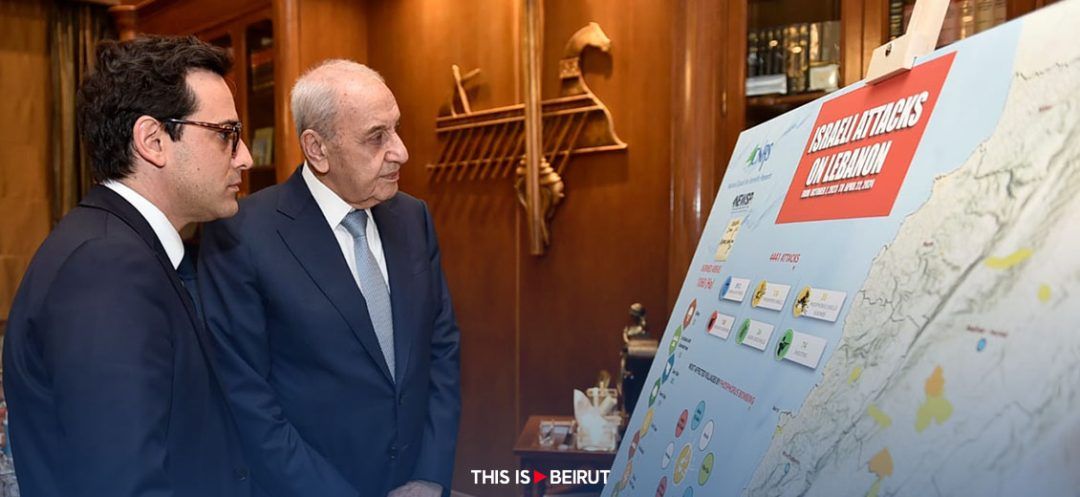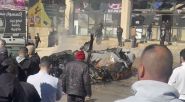
French Foreign Minister Stéphane Séjourné kicked off his political meetings on Sunday by talking to Parliament Speaker Nabih Berri, hours after visiting UNIFIL’s headquarters where he called for ending the alarming escalation of violence in south Lebanon between Hezbollah and Israel.
Accompanied by French Ambassador to Lebanon Hervé Magro and Director of North Africa and the Middle East at the French Ministry of Foreign Affairs Anne Grillo, Séjourné refrained from making any declaration following his meeting with Berri.
For his part, Berri conveyed Lebanon’s readiness “to receive and consider the French proposal aimed at de-escalation, cessation of hostilities, and implementation of UN resolution 1701.”
The Parliament speaker presented evidence of Israeli aggressions on Lebanon, particularly in border villages, using a map prepared by the National Council for Scientific Research (NCSR). The document highlighted the human and material losses, including damage to agricultural and forested lands, as well as Israel’s use of internationally prohibited weapons and violations of the rules of engagement.
Berri expressed gratitude to France and President Emmanuel Macron for their commitment to preventing war in Lebanon, emphasizing Lebanon’s commitment to implementing Resolution 1701 comprehensively.
Regarding the presidential file, Berri commended the efforts of the Quintet committee “striving for consensus in electing a president.”
He also raised the issue of Syrian refugees, underscoring its “burdensome impact on Lebanon and its people.” He pledged to address this matter with the head of the European Commission and the Cypriot president during their upcoming visit to Lebanon, urging France and Germany “to reconsider their approach to Syria on this particular issue.”
Fighting has intensified in south Lebanon in recent weeks, with Israel striking deeper into Lebanese territory, while Hezbollah has stepped up its missile and drone attacks on military positions in northern Israel.
France has for months sought to de-escalate the cross-border tensions, presenting to both Lebanon and Israel an initiative in January seeking to end hostilities.
During his visit to the headquarters of the United Nations' peacekeeping mission in southern Lebanon (UNIFIL), Séjourné reiterated that Paris has been making proposals to "avoid war in Lebanon.”
"I will head to Beirut to meet political authorities to... make proposals," Séjourné said, adding: "Our responsibility is to mitigate escalation, and that is also our role in UNIFIL. We have 700 soldiers here."
A French diplomatic source told AFP that the volume of cross-border attacks had doubled since April 13.
In March, Beirut submitted its response to the French initiative, which was based on a UN resolution barring the presence of any forces other than the Lebanese military and UNIFIL in south Lebanon.
Caretaker Prime Minister Najib Mikati had suggested that Paris was reviewing its proposal and would submit a new one to Beirut.
Sejourne's trip -- which will also see him stop in Riyadh for a summit on Gaza -- coincides with a visit to Jerusalem by US envoy Amos Hochstein as Washington also pushes for de-escalation along the Israel-Lebanon border.
Hezbollah has repeatedly declared that only a ceasefire in Gaza will put an end to its attacks on Israel.
Since October 8 at least 385 people have been killed in Lebanon, including 254 Hezbollah fighters and dozens of civilians, according to an AFP tally.
Tens of thousands of people have been displaced on both sides of the border.
With AFP
Accompanied by French Ambassador to Lebanon Hervé Magro and Director of North Africa and the Middle East at the French Ministry of Foreign Affairs Anne Grillo, Séjourné refrained from making any declaration following his meeting with Berri.
For his part, Berri conveyed Lebanon’s readiness “to receive and consider the French proposal aimed at de-escalation, cessation of hostilities, and implementation of UN resolution 1701.”
The Parliament speaker presented evidence of Israeli aggressions on Lebanon, particularly in border villages, using a map prepared by the National Council for Scientific Research (NCSR). The document highlighted the human and material losses, including damage to agricultural and forested lands, as well as Israel’s use of internationally prohibited weapons and violations of the rules of engagement.
Berri expressed gratitude to France and President Emmanuel Macron for their commitment to preventing war in Lebanon, emphasizing Lebanon’s commitment to implementing Resolution 1701 comprehensively.
Regarding the presidential file, Berri commended the efforts of the Quintet committee “striving for consensus in electing a president.”
He also raised the issue of Syrian refugees, underscoring its “burdensome impact on Lebanon and its people.” He pledged to address this matter with the head of the European Commission and the Cypriot president during their upcoming visit to Lebanon, urging France and Germany “to reconsider their approach to Syria on this particular issue.”
Fighting has intensified in south Lebanon in recent weeks, with Israel striking deeper into Lebanese territory, while Hezbollah has stepped up its missile and drone attacks on military positions in northern Israel.
France has for months sought to de-escalate the cross-border tensions, presenting to both Lebanon and Israel an initiative in January seeking to end hostilities.
During his visit to the headquarters of the United Nations' peacekeeping mission in southern Lebanon (UNIFIL), Séjourné reiterated that Paris has been making proposals to "avoid war in Lebanon.”
"I will head to Beirut to meet political authorities to... make proposals," Séjourné said, adding: "Our responsibility is to mitigate escalation, and that is also our role in UNIFIL. We have 700 soldiers here."
A French diplomatic source told AFP that the volume of cross-border attacks had doubled since April 13.
In March, Beirut submitted its response to the French initiative, which was based on a UN resolution barring the presence of any forces other than the Lebanese military and UNIFIL in south Lebanon.
Caretaker Prime Minister Najib Mikati had suggested that Paris was reviewing its proposal and would submit a new one to Beirut.
Sejourne's trip -- which will also see him stop in Riyadh for a summit on Gaza -- coincides with a visit to Jerusalem by US envoy Amos Hochstein as Washington also pushes for de-escalation along the Israel-Lebanon border.
Hezbollah has repeatedly declared that only a ceasefire in Gaza will put an end to its attacks on Israel.
Since October 8 at least 385 people have been killed in Lebanon, including 254 Hezbollah fighters and dozens of civilians, according to an AFP tally.
Tens of thousands of people have been displaced on both sides of the border.
With AFP
Read more



Comments